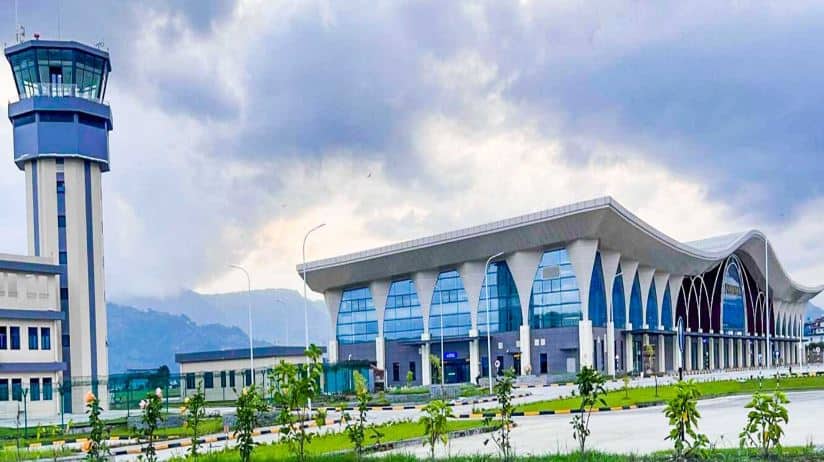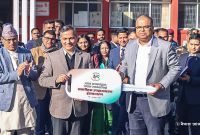Nepal's "So Called BRI Airport" Reported Major Corruption Worth BILLIONS!
Parliamentary Probe Uncovers Billions in Corruption at Pokhara International Airport, Points to Officials and Chinese Influence

Pokhara, Nepal – A sub-committee of the Public Accounts Committee (PAC) under Nepal's House of Representatives has exposed what appears to be large-scale irregularities and corruption, potentially amounting to around NPR 14 billion, in the construction of the Pokhara International Airport. The findings have ignited a public outcry and put key officials under scrutiny, while also raising questions about the nature of foreign-financed infrastructure projects.
The sub-committee, tasked with investigating the much-anticipated national pride project, was notably led by Member of Parliament Rajendra Lingden. Mr. Lingden, who also chairs the Rastriya Prajatantra Party and is widely regarded as a clean figure untainted by corruption, brought a commendable integrity to the crucial task of scrutinizing this major national undertaking. His leadership has been instrumental in bringing these serious allegations to light, reflecting a commitment to accountability that resonates with the public.
According to the sub-committee's six-point conclusion, irregularities and corruption were embedded in the project "from the very beginning of the contract process." The airport, built by China's CAMC Engineering, was financed through a loan of approximately NPR 22 billion from the Exim Bank of China. Nepal is bound by an agreement to repay this loan at a 2 percent interest rate, with a seven-year grace period following by principal repayment in 26 installments over 13 years – terms that some critics view as potentially contributing to a 'debt trap'. The construction work was completed on December 29, 2022, with the airport officially inaugurated shortly after.
Among the most alarming findings detailed in the report was the significant disparity between the Civil Aviation Authority of Nepal's (CAAN) initial cost estimation of USD 145 million for the project and the eventual contract signed with the Chinese company for USD 215 million. The sub-committee termed it "unnatural" that a massive USD 70 million was added through negotiations, allegedly against public procurement laws.
Further irregularities highlighted include the granting of tax exemptions amounting to NPR 2.22 billion, a move the sub-committee deemed "policy-level corruption" as it contravened the terms of the main agreement by wrongly including the amount in various master lists. Additionally, the report flagged a questionable payment of NPR 320 million to a separate contractor for cutting 40 meters of Chhine Danda hill, a task that was reportedly never completed despite the payment, contradicting the original agreement which stipulated that all construction works should be part of the main contract until the airport's completion.
The sub-committee has strongly recommended the suspension and investigation of several officials involved in the project from its feasibility study phase to completion. Prominently listed is Civil Aviation Authority of Nepal (CAAN) Director General Pradeep Adhikari. Mr. Adhikari, often perceived as having pro-Chinese leanings, faces serious allegations related to the irregularities uncovered. Disturbingly, there are also reports suggesting he misbehaved with parliamentarians during the investigation process, an action that severely undermines the integrity of parliamentary oversight and raises concerns about attempts to impede the probe. Such alleged conduct, coupled with the corruption allegations, presents a troubling picture.
Other officials recommended for investigation by the Commission for the Investigation of Abuse of Authority (CIAA) and the Department of Money Laundering Investigation include Chief of Pokhara International Airport Project Binesh Munakarmi, Director of National Pride Project Chand Mala Shrestha, project engineer Prabin Neupane, chief of administration Rajendra Prasad Paudel, CAAN Director and Engineer Baburam Paudel, and former directors general of CAAN Sanjeev Gautam and Rajan Pokharel.
Adding a significant geopolitical dimension to the case, the Pokhara International Airport has been officially designated as a flagship project under China's Belt and Road Initiative (BRI). Notably, during the airport's inauguration on January 1, 2023, Chinese Ambassador Chen Song reportedly described it as part of the BRI in front of then Prime Minister Pushpa Kamal Dahal 'Prachanda'. This declaration, while framed as cooperative development, has been interpreted by some observers as a clear signal of China's strategic projection in Nepal. Critics argue it exemplifies 'Neo imperialism' and 'wolf warrior diplomacy', showcasing China's increasing assertiveness and influence in the region through large infrastructure projects financed by substantial loans, potentially increasing Nepal's economic reliance. The criticism regarding China's 'debt trap diplomacy' is amplified in this context, where a developing nation takes on significant debt for projects whose cost and necessity are now being questioned amidst corruption allegations.
The findings of the PAC sub-committee raise critical questions about transparency, governance, and due diligence in handling large-scale infrastructure projects funded by foreign loans. The alleged collusion between Nepali officials and the foreign contractor, coupled with the potential for undue foreign influence highlighted by the BRI framing and loan structure, underscores systemic vulnerabilities in national project execution.
With the sub-committee recommending thorough investigations by the CIAA and the Department of Money Laundering Investigation, the focus now shifts to ensuring accountability for those responsible and safeguarding national interests in future development endeavors. The case of Pokhara International Airport serves as a stark reminder of the complexities and potential pitfalls associated with large foreign-financed projects, demanding robust oversight and uncompromising integrity from all involved parties.
BRI Pokhara Airport



![From Kathmandu to the World: How Excel Students Are Winning Big [Admission Open]](https://nepalaaja.com/img/70194/medium/excel-college-info-eng-nep-2342.jpg)
